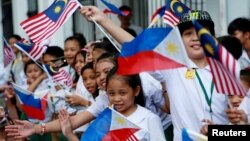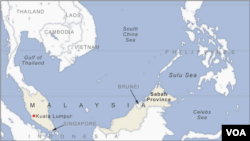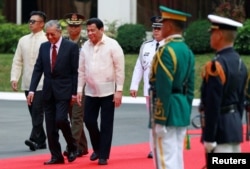Philippine President Rodrigo Duterte lauded the visiting Malaysian prime minister last week for his country's role in keeping peace in a restive Muslim region and predicted “more good work” ahead.
Despite that praise for Mahathir Mohamad and a long-term bilateral friendship, Malaysia and the Philippines still share what some call Asia’s most dangerous sea.
The Sulu Sea between Malaysia’s Sabah province and the southernmost Philippine islands remains unsafe because an independence-minded group of Muslims linked to a former sultanate has so much effective control that law enforcement vessels find it hard to stop an ever-present but increasingly obvious wave of crime.
“It’s an area that has not been patrolled so much. The area is very porous. It’s an area where traditionally people do not recognize national boundaries, so it’s easy to cross,” said Maria Ela Atienza, a University of the Philippines political science professor.
Illegal migrants, drug traders, weapons smugglers, pirates and terrorists all depend on the sea for movement, scholars say.
De facto control
A local Muslim group, backed by the ethnic Tausug, has exercised real or de facto rule for hundreds of years over the northeastern corner of Borneo, now mostly Malaysian territory, and Philippine islands across the 260,000-square-kilometer Sulu Sea from it. A political organization called the Sultanate of Sulu controlled much of the sea coast from 1578, but its power waned after the Philippines stopped recognizing its sultans in the 1970s.
The Malaysian government still pays rent to heirs of the sultanate but has administrative control over the land on its side of the sea. Loss of Muslim political control has spawned unrest in the southern Philippines, leaving an estimated 120,000 dead since the 1960s.
Both Malaysia and the Philippines have moved since 2017 to modernize their navies, but analysts say they lack the strength to stamp out crime. The lack of a grip on the sea means "dire consequences for regional stability,” said Enrico Cau, associate researcher at the Taiwan Center for International Strategic Studies.
“The navy has always been very poor in terms of budget and maintenance,” Atienza said.
The regional database ReCAAP Information Sharing Center logged seven actual or attempted incidents in the Sulu-Celebes Sea in 2017 and 2018, making it the riskiest international waterway in Asia over that period.
“The problem of course is that as far as the Tausug are concerned, there is no border,” said Ramon Casiple, executive director with the Philippine advocacy organization Institute for Political and Electoral Reform in Metro Manila. “On a daily basis, they don’t use passports. They can go back and forth between Sabah and Tawi Tawi, Sulu," he said, naming two Philippine provinces.
Unchecked movement across the Sulu Sea caught Manila’s attention in 2017 when it found Malaysian and Indonesian nationals fighting alongside Muslim rebels in the nearby Philippine city Marawi. Troops battled the rebels for five months, costing about 1,100 lives.
In January, an Islamic State-backed local Muslim rebel group took credit for bomb blasts that killed 20 people and injured 111 at a church in Sulu province.
Joint efforts to improve safety at sea
Officials from Malaysia, the Philippines and Indonesia have talked at least since the 1990s about developing the coastal economy and improving joint security for the sea. In June 2017 the three countries launched joint maritime patrols based out of Indonesia and, five months later, joint air patrols out of Malaysia.
But changes in leadership among the three countries, followed by shifting national priorities, have held up progress on economic development, said Song Seng Wun, an economist in the private banking unit of CIMB in Singapore.
“I think quite a lot to do with domestic politics overtaking these plans,” Song said. “There’s really a lot to do with the shifting (of) respective government focus.”
The three countries may prefer to avoid further talks on security in case any one party grows uncomfortable with the process, Cau said.
In his meeting March 7 with Mahathir, Duterte called “resolving security issues, particularly on terrorism, piracy, and transnational crimes” an issue the two countries should pursue to improve their relations, the presidential website in Manila said.
Duterte, who is from Mindanao, has tried to stop Muslim violence since he took office in 2016.
“I think the big concern for Duterte is to stabilize the maritime space between Malaysia and Mindanao,” said Carl Baker, director of programs with the think tank Pacific Forum CSIS in Honolulu.






